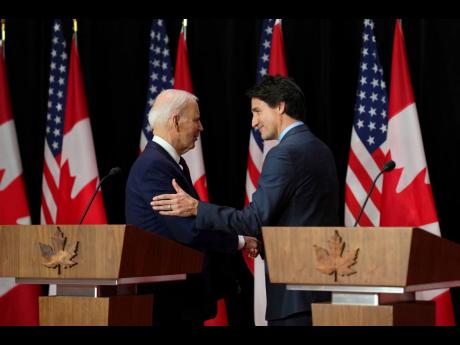Elizabeth Morgan | Reframing globalisation
We are indeed living in interesting times. We are still dealing with the fall-out from the global pandemic; a war is still raging in Europe; inflation remains a concern; we just had the Sino-Russia Summit aimed at strengthening this alliance; a banking crisis; and the Canada-US Summit focused on cooperation.
The world remains interdependent and, like others, I do not think this will change drastically anytime soon. However, it is evident that a change in the approach to globalisation is in progress in a continuing power struggle, USA vs China.
President Joseph Biden made his first state visit as president to the United States’ neighbour to the north, Canada, from March 23-24. He had visited Mexico during the Three Amigos Summit held there in January. I listened with interest to the Biden-Trudeau press conference on March 24.
An important part of the discussions was centred on collaboration in production and trade. A similar discussion had taken place with Mexico. The USA’s major export partners are Canada, Mexico and China; and its import partners are China, Canada and Mexico.
The trade disputes with China, the pandemic and the war in Ukraine have made it clear to countries in the West that it was a mistake to become so dependent on China for production and supply of goods in the globalisation process.
The question was posed recently as to whether China’s rise as an economic power was enabled by the USA and the European Union (EU). The answer to that has to be yes. The USA facilitated China’s membership of the World Trade Organization (WTO) in 2001, and US and European investors rushed to avail themselves of the cheap labour, moving their production to China. But, alas, everything in the long run has a price.
FOREIGN POLICY ERROR
So, the situation is now generating a rethink of globalisation, with the effort to return some level of production to home territories - in this hemisphere, to the USA and Canada, with a look at near-shoring to situate production in Mexico and other countries. The USA’s tepid relationship within the Western Hemisphere has historically been a foreign policy error. This often-strained relationship also allowed China’s entry into Latin America and the Caribbean with its Belt and Road initiative. I have addressed this situation in previous articles.
Note that the Summit of the Community of Latin American and Caribbean Countries (CELAC), hosted by Argentina, was held in January and, departing from previous practice, a delegation from the USA attended. Venezuela, Nicaragua, Ecuador and Mexico were not present at heads level. An EU-CELAC Summit is to be held in Brussels in July.
Another factor in the globalisation rethink is the role of the group of BRICS (Brazil, Russia, India, China and South Africa) in influencing global economic policy. It would seem that there is a stronger alliance building between China and Russia arising from their summit on March 21. The BRICS, a grouping of emerging economies, had great plans to strengthen their alliance and establish a new international financial system. In this regard, they established a new Development Bank located in China. There also seems to be a bid to make the Chinese yuan a global reserve currency, thus providing an alternative to the US dollar. A number of developing countries viewed the emergence of the BRICS with optimism.
BALANCING RELATIONSHIPS
In spite of the group’s strength on paper, at the moment, I am not clear on the positions of Brazil, with the return of President Luis Inacio Lula De Silva, a founding member, and South Africa, with its economic and political difficulties. It seems that, like China, Brazil wants to play a peacemaker role in Ukraine. India is doing much better overtaking the United Kingdom as the world’s fifth-largest economy. It would seem to me that a better assessment of the situation with the BRICS, in the political and economic arenas, would be possible when their summit is held in August in South Africa. India will also host the G20 Summit in September.
Note that Barbados’ proposal to reform the global financial system (the Bridgetown Initiative) is relevant in this discussion. France will host a related international conference on a new global financial pact in June.
Within CARICOM countries, it is very important to monitor developments in the global economy as globalisation is being discussed and reframed. We need to be aware of discussions taking place in our hemisphere, and whether CARICOM countries can position themselves to benefit from changes in economic policies. Our major export trading partners are in the West. We also need to be aware of developments in the BRICS. While CARICOM countries import from Brazil, China, India and Russia, exports are negligible. Again, balancing relationships remains important. CARICOM has been invited to BRICS Summits in the past as well as to the G20. An invitation is always a good opportunity for consultations.
Elizabeth Morgan is a specialist in international trade policy and international politics. Email feedback to columns@gleanerjm.com.

